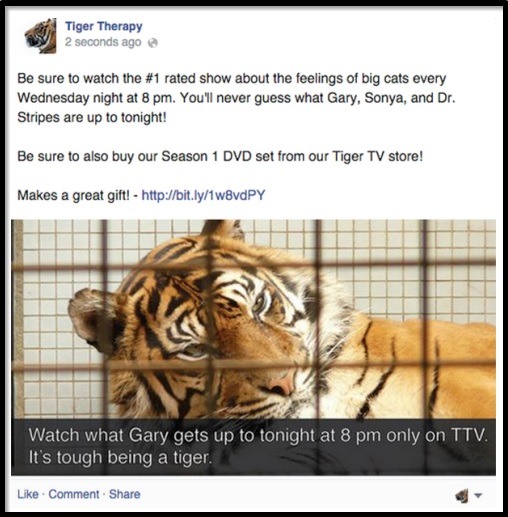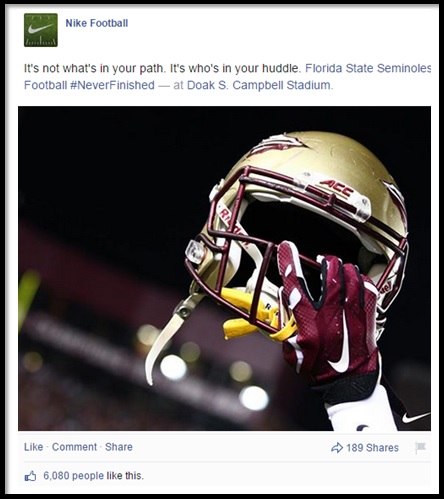It’s our “Best of JacoBLOG” as we count down the days to when we return to work. So in between football games, maybe you’ll have a few minutes to read the wisdom of Lori Lewis. This post was a big one in 2014, and is a reminder that the winds of social media are changing. – FJ
 No one studies the social space more than Lori Lewis. She spends most of her waking hours gaining a better understanding of the ebb and flow of social media, from Facebook to Twitter to Snapchat and even new platforms like Biz Stone’s new Super.
No one studies the social space more than Lori Lewis. She spends most of her waking hours gaining a better understanding of the ebb and flow of social media, from Facebook to Twitter to Snapchat and even new platforms like Biz Stone’s new Super.
Jacobs Media clients know that Lori has issued numberous warnings about the changing rules on Facebook for some time now. Social media is a space that radio operators “rent,” but can never own. And when it comes to Facebook, Mark Zuckerberg is a landlord with very clear goals for his property. Back in April she wrote a post “Is Facebook’s Free Ride Really Over?” that talked about the changing winds on social media’s biggest platform.
Many radio people keep up with Nielsen, the FCC, and the industry trade publications. But very few read the fine print on Facebook. In today’s post, Lori shares some very important changes in their rules, whether you’re paying for advertising on Facebook or simply squatting in Zuckerberg’s backyard. These changes impact most broadcast radio stations, so listen up. – FJ
You no longer have to take it from me that people don’t want to be pitched by pages they have “liked” when they scroll their Facebook News Feeds.
Mark Zuckerberg has now stepped in and has thrown down the “spam gauntlet.”
In a vow to better protect his users from (unpaid) promotional noise, his latest message is clear: If you want to promote something, pay for it.
Starting next month, Facebook will start hiding status updates that are really promotional posts.
Facebook says this stems from users complaining more about posts from pages they have “liked,” than the actual ads they see. And that makes sense. When you see an obvious advertisement, your tolerance level is higher. You know they’re there (just like stopsets on the radio).
But when it’s a status update that feels like an ad, that’s when you’ve chipped away at the trust you were given by your audience when they “liked” your page in the first place.
Some of the common traits that Facebook lists that make status updates feel like spam:
- Posts that solely push people to buy a product or install an app.
- Posts that push people to enter promotions and sweepstakes.
- Posts that reuse the exact same content from ads.
Facebook also offers visual examples of what they are talking about, such as this:
These posts should look familiar to many people in radio because they resemble much of the Facebook language that stations often use.
The Facebook crackdown should come as no surprise. In just the past year alone, Facebook has talked about not wanting to be seen as a free distribution platform for your promotions.
One year ago, the company released the document, “Generating Business Results on Facebook.”
In it, they wrote that posts are becoming too promotional. As a result, organic (free) reach will decrease. And in order to “maximize delivery of your message in the News Feed, your brand should consider using paid distribution.”
In June of this year, Facebook once again talked about declining organic (free) reach:
“Competition in the News Feed is increasing, becoming harder for any story to gain exposure.
Like TV, search, newspapers, radio and virtually every other marketing platform, Facebook is far more effective when businesses use paid media to help meet their goals.”
And just last month, Mark Zuckerberg held his first public live Q&A from Facebook Headquarters. He talked about how they control content flow:
“For each person on Facebook, there’s an average of 1,500 different stories a day that they could see in their News Feed. So to ensure that users are always seeing the ‘highest quality content,’ they only see about 100 to 300 of those 1,500 potential posts.”
He was quick to point out that brands don’t always have to pay to ensure their status updates are seen by fans – you just have to make your Facebook content great.
And he’s right because posts that move people will find an audience whether you pay to reach them or not.
But that gets lost on a lot of people. They would rather blame Facebook for declining reach than for their own content and behavior shortcomings.
Social is a way of thinking, it’s not a trick.
It’s not about gaming fans to interact with us.
It’s not about what we want to say or our prize wheels.
It’s about what the fans want to hear when we’re coming at content from their point of view, and personalizing acknowledgement.
It’s about proving our worth in their News Feeds.
For just one example of what that looks like, Nike, a sponsor of Florida State University’s football program, posted this recently. And the message resonated, deeply.
This is what liquid content looks like – stories people crave; that hit them emotionally.
It’s a skill we need to work at every day.
Just because Facebook is free (for now) does not equate with it being easy to master.
And there’s nothing wrong with asking for help. No matter how great you are, you can’t always coach yourself.
It’s time to focus on being more effective with Facebook. That means we have to stop treating it like a free promotional platform, or an afterthoughtm and start bringing our A games every day.
The free ride is ending.







Leave a Reply